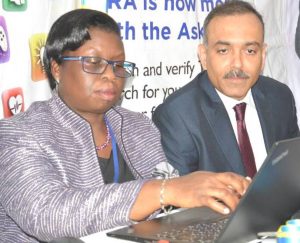Uganda improves ranking for E-Government services

Doris Akol, the Uganda Revenue Authority Commissioner General and Rakesh Jha try out an online option to pay taxes through Barclays Bank Uganda earlier this year.
July 26, 2018—Uganda’s online service index has improved from 50 pc in 2016 to 57 pc in 2018, according to the latest United Nations E-Government survey, which puts the country in the favourable high online service index bracket. Denmark, Australia and South Korea top the world rankings.
James Saaka, the Executive Director at the National Information Technology Authority- Uganda (NITA-U) said the ranking is a direct result of the government’s deliberate efforts to automate the majority of its systems. This is to ensure citizens can access government services more efficiently.
“Through technical support from NITA-U, under the Ministry of ICT and National Guidance, a number of Ministries, Departments and Agencies (MDAs) have taken services online. This has resulted into the automation of processes and development of services which are already improving efficiency and transparency,” he said.
With a grading of High e-Participation on the index, Uganda was lauded for the improvement in this score as it showcases Uganda’s commitment in implementing further tools for engaging citizens. According to the survey, the three most commonly used online services in 2018 are utilities payment, submission of income taxes, and registration of new businesses.
Saaka said, “As a government, we have realized a saving of 4 million working hours that can be attributed to this automation. In addition, we have set up an E-Citizens portal which is a one-stop online center for government online services. To date, 76 MDA informational and transactional services may be accessed through this portal.There are currently 66 million transactions going through the citizens’ portal.”
The survey is the only global report that assesses the e-Government development status of all UN member states. It measures e-Government effectiveness in the delivery of public services and identifies patterns in e-government development and performance.
Results are tabulated and presented as a set of standardized index values on a scale. Uganda’s e-Government development index (EGDI) also improved from 36 pc in 2016 to 41% in 2018, which is above the African average of 34 pc.
Citizens can access the above services by visiting, http://ecitizen.go.ug/. What’s even more exciting is that access to the portal is free of charge when one is using free WiFi, MyUG that is accessible across 284 locations in Kampala and Entebbe.
Peter Kahiigi, Director e-Government, urged all MDAs to embrace e-Government. He said, “The benefits of e-Government are patent. It enables citizens, enterprises and organizations to carry out their business with government more easily, more quickly and at lower cost, improve services and convenience to citizens as well as creating a more accountable government to increase transparency and fight corruption.”
As a good example, Kahiigi spoke of the e-visa platform which allows foreigners to apply for visas of all classes, visa renewal and insurance, residence permits application/renewal and issuance, work permits /entry permits, passes (student pass, dependent passes and special passes) and certificates of residence. By the end of 2017, more than 212,000 applications and application time reduced from one month to five working days.

 African Heads of state head to South Korea next week for Summit talks
African Heads of state head to South Korea next week for Summit talks
 Trading leads as main source of income for Ugandans
Trading leads as main source of income for Ugandans
 New leadership for bankers’ umbrella as total assets top $12 billion
New leadership for bankers’ umbrella as total assets top $12 billion
 Brussels Airlines to announce Nairobi service
Brussels Airlines to announce Nairobi service
 SITA promises enhanced travel experience after Materna acquisition
SITA promises enhanced travel experience after Materna acquisition
 Saudia’s 105 aircraft order stretches A320neo lead over rival Max
Saudia’s 105 aircraft order stretches A320neo lead over rival Max
